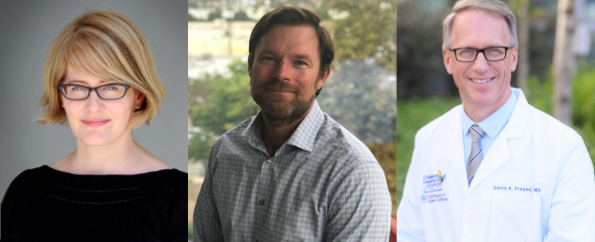For all that cancer has been investigated—its biology, causes, treatments and prevention—very little is known about many of its long term impacts on the lives of people who survive their disease. But the aftereffects of cancer continue in numerous spheres for years after treatment and cure: physical, psychological, social, personal, educational, professional, and financial.

This dearth of research into all-around life outcomes is especially true for adolescents and young adults (AYAs, defined as ages 15-39) who develop cancer and undergo treatment during what is already a dynamic and often stressful phase of life. In the case of young adult cancer survivors, researchers from various disciplines have only just scratched the surface, according to the founders of the new USC Center for Young Adult Cancer Survivorship.
Cancer's long term impact.
"Young adulthood ups the ante when it comes to the issues in cancer survivorship," said Center cofounder Kimberly Miller, PhD, MPH, Clinical Assistant Professor in the Department of Preventive Medicine and Dermatology at Keck School of Medicine. "It's a time when people become more autonomous, more independent financially, move out of their parents' homes, and form new significant relationships." Add to that mix a serious disease, physically and emotionally arduous treatment, medical bills, deferred school or college, missed work, and the disease can engender lasting negative effects not just on survivors' physical health, but on their personal and professional success, as well.
Studying and improving the health and well-being of younger cancer survivors had been a shared topic of interest for several years for Miller and USC colleagues David R. Freyer, DO, MS (Professor of Clinical Pediatrics and Medicine at Keck School of Medicine, and Director of the cancer survivorship programs at both Children's Hospital Los Angeles and USC Norris Comprehensive Cancer Center) and Joel Milam, PhD (Associate Professor of Research in Preventive Medicine at Keck School of Medicine).
In one sense, the issues of cancer survivorship are a good news/bad news situation. "Survival rates for young adults with cancer are better than ever, and even superior than in some other age groups," said Freyer. "With more young adult survivors than ever before, it's critically important that we understand the many impacts of the disease. We look at life after cancer as living the best life one can—physically and psychosocially.
Freyer, Milam and Miller believed that effective understanding of the important issues of cancer survivorship among young people could only come about through the work of broad, interdisciplinary research collaboration. Last year they began speaking about their research goals with Thomas Buchanan, MD, Director of the Southern California Clinical and Translational Science Institute (SC CTSI), who encouraged them to establish the Center.
"The practical advice we received from Dr. Tom Buchanan and others in the Office of Research about how best to get the Center started, such as placing it under the Keck School of Medicine, and the reporting pathway through the USC Norris Comprehensive Cancer Center, was immensely helpful," said Freyer. “This ensures that the Center is highly integrated with various departments within the Keck School of Medicine and research teams within Norris. It’s all about team science.”
Getting started with a team building grant.
A team building grant from the SC CTSI enabled the researchers to establish the new USC Center for Young Adult Cancer Survivorship, which was formally approved in February 2019 by the Keck School of Medicine at USC and the Office of Research. The team building grant provided funds they needed to draw investigators together in developing the research collaborative, as well as an opportunity to get more familiar with the principles of team science that are at the core of their approach.
The Center comprises over 25 USC faculty members and research affiliates representing academic units within USC, but involvement is open to any interested faculty, as well as pre- and postdoctoral scholars, and physicians in fellowship training. Academic units include the Divisions of Pediatric and Medical Oncology, Department of Preventive Medicine, the Institute for Health Promotion and Disease Prevention Research, the USC Gehr Center for Health Systems Sciences & Innovation, the Los Angeles County Cancer Surveillance Program, and high-volume clinical facilities including Children’s Hospital Los Angeles, the USC Norris Comprehensive Cancer Center, and Los Angeles County + USC Medical Center.
Between them, Freyer, Milam and Miller are conducting several ongoing research projects in young adult survivorship, but one that promises to be of particular utility is called Project Milestones, a National Cancer Institute-funded R01 study. This cohort study in Los Angeles will collect data among long-term AYA survivors of cancer, 3-10 years from end of therapy, concerning psychosocial adjustment, physical health, employment rates, marital status, and children. To identify survivors, the project will use data from the LA Cancer Surveillance program. "So little is known about this population, and once this data is collected it will become the crown jewel for the Center," said Milam.
Although young adult survivorship is drawing more interest among researchers and institutions, this survivorship research program is the first of its kind in the country that's dedicated to gaining a comprehensive understanding of the well-being of young survivors, say its founders. "Our vision for the future is that the Center will become a world class resource for people who are developing interventions, as well as a training resource from undergraduates to residents," said Milam. "And over time, we hope it will be an avenue for additional outreach to the community."
